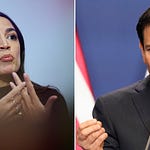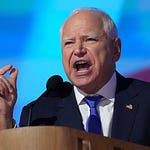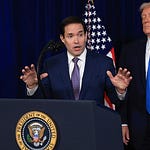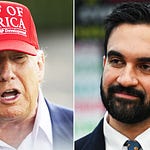Barack Obama has been one of the most politically active former presidents in modern times. And in the aftermath of a historic peace deal where he couldn’t even bring himself to say Donald Trump’s name, Obama’s jealousy and bitterness couldn’t be any more obvious. The man once hailed as a unifier now sounds more like a jilted ideologue watching his legacy unravel.
He recently joined alleged “comedian” Marc Maron on his long-running “WTF” podcast, where he could no longer hide his disdain. Obama not only blasted Trump for betraying his supposed “values,” but openly called for institutions to resist his successor’s administration—an extraordinary move for a former president who once lectured Americans about respecting norms and democratic transitions.
There is something deeper at work here than just a former president lashing out. Barack Obama has carefully cultivated image as the intellectual moral center of American politics — a media mirage that is is currently collapsing under the weight of reality.
Trump did what Obama couldn’t: revive the economy, secure the border, cut through bureaucratic stagnation, and, yes, bring about peace abroad.
For Obama, that’s a humiliation his silver tongue can’t talk its way out of.
Obama’s criticism of Donald Trump’s domestic National Guard deployments and his warnings that “institutions have been weakened deliberately” sound less like concern for democracy and more like a confession of failure. Decades of rot in Democrat-run cities have led us to this — a long brewing crisis that Obama not only neglected, but accelerated.
The irony is that many of the same “guardrails” Obama laments were eroded under his own administration: the IRS targeting political opponents, the Justice Department shielding Hillary Clinton, and intelligence agencies spying on Trump’s campaign.
What Obama describes as ‘institutional damage’ was hatched on his watch.
Behind the polished rhetoric and professorial tone lies an unmistakable envy. Trump achieved in four years what Obama could not in eight: peace agreements in the Middle East, record-low minority unemployment, energy independence, and a working-class economic boom that lifted all boats. Obama promised “hope and change.” Trump delivered results.
The numbers don’t lie. Under Obama, GDP growth averaged a paltry 1.6%—the weakest post-recession recovery in modern history. Labor force participation hit a 38-year low. The $800 billion stimulus bill created temporary jobs at an astronomical cost, while Obama later laughed about the absence of “shovel-ready projects.”
Obamacare, his signature domestic achievement, raised premiums over 100% for millions of Americans and forced families off their preferred doctors and plans. By contrast, Trump’s tax reform and deregulation efforts unleashed business confidence, drove real wage growth, and brought unemployment to 50-year lows before the pandemic hit.
Even on foreign policy, the contrast is glaring. Obama withdrew from Iraq prematurely, enabling the rise of ISIS, and drew a “red line” in Syria that became a punchline. He sent pallets of cash to Iran and received nothing in return.
Meanwhile, Trump crushed ISIS in months, kept Iran in check, and brokered the Abraham Accords—something the foreign-policy establishment, including Obama, deemed impossible. For all the awards and accolades Obama received—including a Nobel Peace Prize for doing nothing—Trump accomplished more for global peace in practice.
The former president’s recent anger isn’t about policy—it’s about pride. Obama built his identity around being history’s transformational figure, the man who would transcend race and division. But instead of uniting the country, he presided over one of its most racially fractured periods.
His interventions in the Gates arrest, the Trayvon Martin case, and Ferguson all deepened racial resentment. His Justice Department under Eric Holder and later Loretta Lynch turned the concept of “equal justice” on its head — DEI being a smokescreen for new age racism. Obama’s public rhetoric—often painting America as systemically racist—helped birth the divisive politics of identity that plague us today.
The “systemic racism” in America is firmly rooted in the Democratic Party, which has done its damndest to deepen the racial divide and entrench it in every aspect of American society.
Now, as corporate America retreats from diversity, equity, and inclusion programs that failed to produce anything but resentment and lowered standards, Obama’s frustration is palpable. He urges universities and corporations to “stand by their convictions” and resist “bullying” from the government.
Translation: he’s angry that the DEI bureaucracy he inspired is collapsing under its own moral and practical failures. Trump’s rollback of forced ideological compliance—his insistence on merit, opportunity, and colorblind fairness—has revealed the bankruptcy of Obama’s racialized worldview.
Obama’s indignation at Trump’s use of federal authority also rings hollow. He condemned Trump’s National Guard deployments to crime-ridden cities, claiming they threatened democracy. Yet this is the same president who used the IRS to target political opponents, spied on journalists like James Rosen, and oversaw Operation Fast and Furious—a reckless gun-running scheme that armed Mexican cartels and killed a U.S. Border Patrol agent. He ignored the pleas of Americans trapped in Benghazi, then blamed a YouTube video to deflect responsibility. His administration’s scandals were not just numerous—they were lethal.
And while Obama lectures about “norms” and “institutions,” his chosen successor, Joe Biden, plunged those same institutions into unprecedented crisis. The border was in chaos, inflation gutted the middle class, and America’s standing abroad plummeted. Biden’s presidency, crafted in Obama’s image and staffed by his former aides, was the natural extension of his failures—only without the charisma to disguise them.
Obama’s public comments about Trump are, in a sense, an indirect defense of his own record. Every Trump success is a reminder of his own unfulfilled promises.
Obama once said that history bends toward justice. Maybe. But history also bends toward results, and that’s where he falls short.
His presidency was built on image and aspiration, not execution. His speeches inspired—but his policies suffocated growth, emboldened adversaries, and divided citizens. He left office with record debt, stagnant wages, and a fractured electorate.
Trump, for all his brashness, proved that unapologetic leadership and economic realism can do more for working Americans than eight years of polished symbolism ever could.
Obama’s bitterness is understandable. His legacy was supposed to be permanent. Instead, it’s been dismantled piece by piece—by a man the establishment mocked, underestimated, and tried to destroy. Trump’s accomplishments didn’t just outshine Obama’s—they exposed how shallow they were. That’s what Obama can’t forgive.
So when the former president warns of “weakened institutions” or lectures corporations about moral courage, what he’s really doing is pleading for relevance.
His era is over. His vision failed. And his successor’s presidency has proved to be the final indictment of his own.
Obama can continue to criticize. But history will remember this simple truth: while he talked about change, Trump made it happen.











